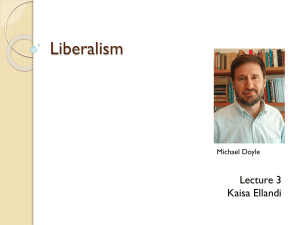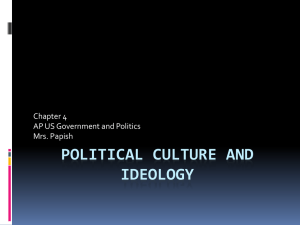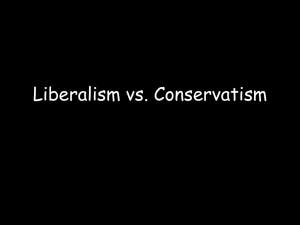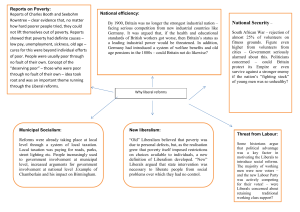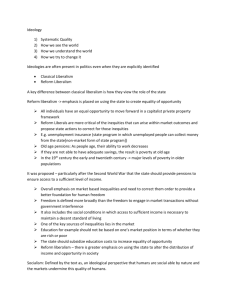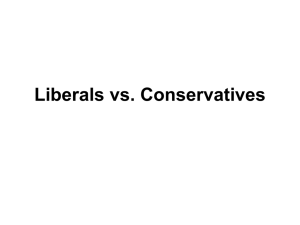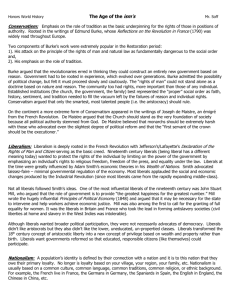Comparing Political Ideologies
advertisement
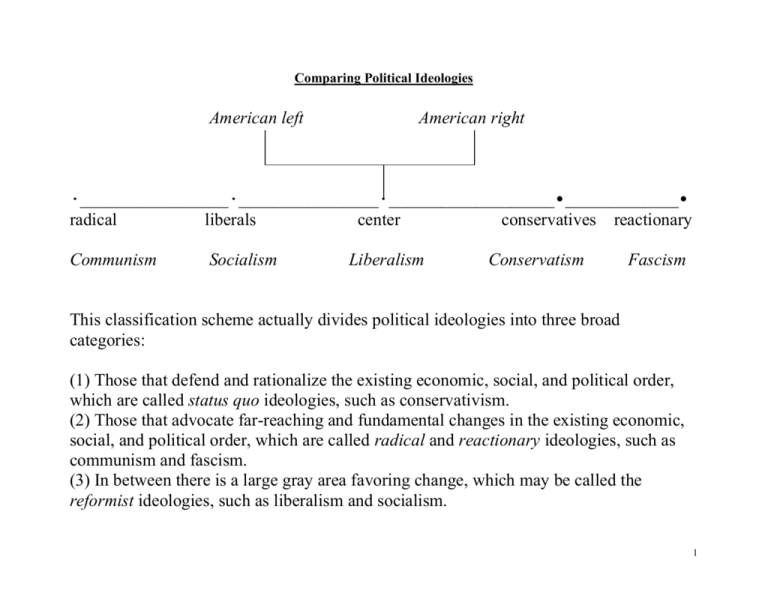
Comparing Political Ideologies American left American right ∙_________________∙________________∙___________________•_____________• radical liberals center conservatives reactionary Communism Socialism Liberalism Conservatism Fascism This classification scheme actually divides political ideologies into three broad categories: (1) Those that defend and rationalize the existing economic, social, and political order, which are called status quo ideologies, such as conservativism. (2) Those that advocate far-reaching and fundamental changes in the existing economic, social, and political order, which are called radical and reactionary ideologies, such as communism and fascism. (3) In between there is a large gray area favoring change, which may be called the reformist ideologies, such as liberalism and socialism. 1 Negative and Positive Conceptions of Liberty and Freedom For early or classical liberals, liberty or freedom was a natural right, an essential requirement for leading a truly human existence and, therefore, it consisted in each person being left alone, free from interference from government and able to act in whatever way they may choose. This conception of liberty or freedom is “negative” in the sense that it is based upon the absence of external restrictions or constraints upon the individual. For modern liberals, liberty or freedom was seen as the condition in which individuals were able to develop their skills and talents and fulfill their potential and, therefore, it was defined as the ability to be one’s own master and to be autonomous, which requires equal opportunity as one of essential conditions for all individuals to be able to develop such ability. Therefore, liberty or freedom meant more than simply being free from external constraints: it involved the capacity of human beings to lead a truly human existence and achieve their selfrealization and, therefore, the necessary condition for developing that capacity. The competing conceptions of liberty led liberals to hold different views about the desirable relationships between the individual and the state. 2 Different Conceptions of Justice For early liberals, justice means equality of opportunity in which each individual should have the same chance to rise or fall in society, or the equal chance to develop their unequal skills and abilities because people were not born equal in terms of talents and skills. Therefore, it was right to reward merit, ability and willingness to work. Those with more ability or who worked harder “earned” their wealth and deserved to be more prosperous than the lazy or incapable. A market capitalist society created the social condition in which each individual could prosper according to his or her merits. For modern liberals, justice meant “fairness,” which meant that a just society would be one in which wealth was redistributed through some form of welfare system for the benefit of the less fortunate. Laissez-faire capitalism led to new forms of injustice that privileged some and disadvantaged others. As a result they favored government help and intervention in social and economic life, so as to promote greatest equality of opportunity and achieve a socially just society. 3 Social Contract Theory Similarities between Hobbes and Locke According to Hobbes and Locke, human beings are selfish, greedy, and powerseeking, and thus free individuals in a stateless or lawless society have a tendency towards encroaching upon the freedom of others, steal the property of others, exploit others, or even turn them into slaves if it is in their interests to do so. As a result, rational individuals would recognize that it is in their interests to surrender a portion of their liberty and right in order to set up a system of law for protection of their freedom; otherwise their rights and their lives would constantly be under threat. Thus, rational individuals would enter into an agreement, or “social contract,” to establish a sovereign state to restrain all individuals and groups within society and safeguard freedom of each person from being encroached upon by the other. Therefore, according to the social contract theory, political authority comes from below and the state is created by individuals and for individuals; it exists to safeguard and serves their interests and needs. This is the very foundation on which the whole concept of democracy is based and how it is defined. 4 Differences between Hobbes and Locke Hobbes constructed a picture of what life had been like before government was formed – a stateless, disordered, or anarchic society, or what he called a “state of nature” characterized by “wars of all against all.” Hobbes argued in Leviathan (1651), at the time of the English Civil War, that only a strong government, preferably a monarchy, would be able to establish order and security in society and prevent a society descent into a “state of nature.” Therefore, the citizen should accept any form of government because even repressive government is better than no government at all. Hobbes therefore placed the need for order above the desire for liberty. 5 Locke argued against arbitrary or unlimited government. Government is established to protect individual rights of “life, liberty, and property.” When these rights are protected, citizens should respect government and obey the law. If government violates these rights, citizens should have the right of rebellion, because government arises out of the agreement or consent of the governed. Government itself could break the contract. When government breaks the contract or turns itself against the purpose for which it is established, it loses its legitimacy, and the people have the right of rebellion. This principle was developed by Locke in Two Treaties of Government (1690) to justify the Glorious Revolution of 1688, which established a constitutional monarchy in Britain in the 17th century. It was also developed by Thomas Jefferson in the American Declaration of Independence (1776), which declares that when government becomes an absolute despotism, “it is the right of the people to alter or abolish it.” In later centuries, liberals have often used the idea of individual rights to justify popular revolt against tyrannical government. 6 Where is the key point where liberals disagree with Anarchists and Marxists on the state? Liberals believe that rational individuals would recognize that it is in their interests to surrender a portion of their liberty and right in order to set up a system of law for protection of their freedom; otherwise their rights and their lives would constantly be under threat. As John Locke put it, “where there is no law there is no freedom.” This is where anarchists disagree with liberals. Anarchists believe that society develops naturally out of the free actions of individuals and voluntary associations and, therefore, both law and government are unnecessary. Liberals portray the state as an umpire or neutral referee in society. The state embodies the interests of all its citizens and acts as a neutral arbiter when individuals or groups come into conflict with one another. This liberal view is where Marxists disagreed, and they believed that the state was the instrument of the ruling class, not “a neutral arbiter” among competing individuals and groups. 7 Conservatives vs. Liberals Human nature Human rights The role of the state Social change Conservatives Humans are essentially limited rational creatures, and they differ in motivation, ability, and moral character, and such differences contribute to the disparities in wealth and privilege. Bad human behavior and social evils are humanly or innately rooted, and can not be simply attributed to environmental factors, but to the selfish human nature, individual differences, or breakdown of law and authority. In other words, conservatives hold a pessimistic view of human nature and human beings are both imperfect and unperfectible. As a result, instead of institutional change or governmental “help,” “trade-off” between minuses and pluses within the existing system or enforcement of law and punishment by government is the way to minimize the problems. The net result is good. Conservatives emphasize the primacy of individual economic rights in pursuing personal happiness and wealth, particularly the right to hold, accumulate, and dispose of one’s property without governmental intervention. They believe that the private pursuit of wealth and economic freedom will ultimately lead to public prosperity; therefore, they tend to oppose excessive concern with economic equality and governmental effort to provide disadvantaged persons with public housing, public jobs, universal health care. Government should not intervene to “help” and governmental intervention, such as social welfare programs, regulated business and industry, heavy or progressive taxation, or any social program that involves large-scale redistribution of wealth , etc., will undermine the incentive system and the allocative efficiency of the market and ultimately turn the free, dynamic economy into a special interest, rent-seeking society, which make the economy less efficient, less productive, and less dynamic. Pessimistic about the possibility of improving a particular sociopolitical system, and expect that custom, tradition, established institutions and social norms provide the sound basis for a stable social order, security, continuity, protection of economic freedom; have a certain bias in favor of the existing system or conserving what exists; if change is needed, it should be approached very cautiously. Liberals Humans are largely rational beings and capable of personal development, rational action, and mutual aid, but they are often caught in difficult situations. Bad human behavior and social evils are socially rooted, and caused by evil institutions or the environment. In other words, liberals hold a more optimistic view of human nature and human beings can be made “good” if their social conditions are improved. For example, to reduce crimes, society must mitigate the conditions of poverty, racism, and despair that breed bad behavior and social evils. As a result, institutional transformation or governmental “help” is necessary for improving environment, correcting the market failures, and resolving difficult situations Liberals emphasize the primacy of individual civil rights and equality; tend to defend individuals or groups who are denied their civil rights or discriminated against, such as freedom of speech, rights of abortion or homosexuals, racial minorities, the poor, and other disadvantaged people; tend to oppose governmental restrictions on freedom of expression and governmental efforts to “legislate morality” for the purpose of upholding community standards and traditions –denying individual choices. Government should intervene to “help” but not “curb” freedom; an essential role of government is to promote equal liberty of each individual person, protect and respect for the dignity of each person in the society, create such conditions that allow all citizens to have the opportunity to develop their abilities and skills, and to make it possible for all citizens to exercise reason, work for better life, and make their own choices. Thus, government assumes the responsibility for the welfare of all citizens through many welfare programs, such as SS, Medicare, family assistance, public housing, pension Optimistic about the possibility of improving a particular socio-political system, and expect the ordinary people to be able to understand their world and to play an important role in bringing about such an improvement. Therefore, future social and political arrangements can be constructed to make society and the world a better place to live for all human beings. 8 Comparison of Liberalism and Marxism Liberalism: (1) Liberalism focuses on individuals who pursue their own economic and political interests rationally in the economic and political marketplace. The pursuit of individual interests will in itself produces the best good for society or lead to “the greatest good for the greatest number.” (2) The primary motivating force is the competition between individuals who seek to maximize their self-interests, satisfaction, or utility through the free market. (3) Therefore, liberalism emphasizes the role of the market mechanism through which economic activity and allocation of resources are coordinated. Markets are self-regulating through the balance of demand and supply, while the state is a “night-watch man” providing the conditions under which markets can be allowed to operate as freely as possible. (4) Since society is consisted of multiple interest groups, conflicts among them are inevitable; but the multiple interest groups and their competitions are performing the function of bargaining and compromise that will eventually minimize the conflicts and shape public policy. (5) Democracy, the free market, and the private-owned property are viewed as better political and economic institutions at facilitating and maximizing economic development, economic efficiency, social justice, freedom, human rights, and many values of human society. 9 Marxism: (1) Marxism rejects the starting point of liberalism (individuals) and argues that it is impossible to discuss any individual without at the same time discussing the total social relationships within which individuals interact with one another. The most fundamental of these relationships involves the “mode of production” which conditions the social, political, and economic process in general and the class conflict in particular. (2) Marxism also rejects liberalism assumption that free competition will contribute to the greatest good of the largest number as well as minimize the conflicts among interest groups. Class conflict is a zero-sum game and tends to intensify rather than minimize the interest conflict due to the existence of the oppressing and oppressed classes and the conflict between capital and labor. (3) The state is seen as the coercive instrument of the ruling class, rather than an entity of providing neutral guarantees for a free competition among classes, groups, and individuals. (4) Capitalist private property is the fundamental source of greed, exploitation, class struggle, injustice, and all social evils, making it possible that some people live by owning and other people live by working – a small proportion of population exploits a large majority of population by the private ownership of the means of production. Therefore, the first step for eliminating social inequality, injustice and other human sufferings is to “eliminate private property” and transform socioeconomic institutions of the private property into socioeconomic institutions of common ownership. (5) “The proletariat dictatorship” or “socialist democracy, planned economy, and public or state ownership are viewed as better political and economic institutions at mitigating social inequality, insecurity, injustice, and other social evils and maximizing economic development, human potentiality, and common wealth. 10
